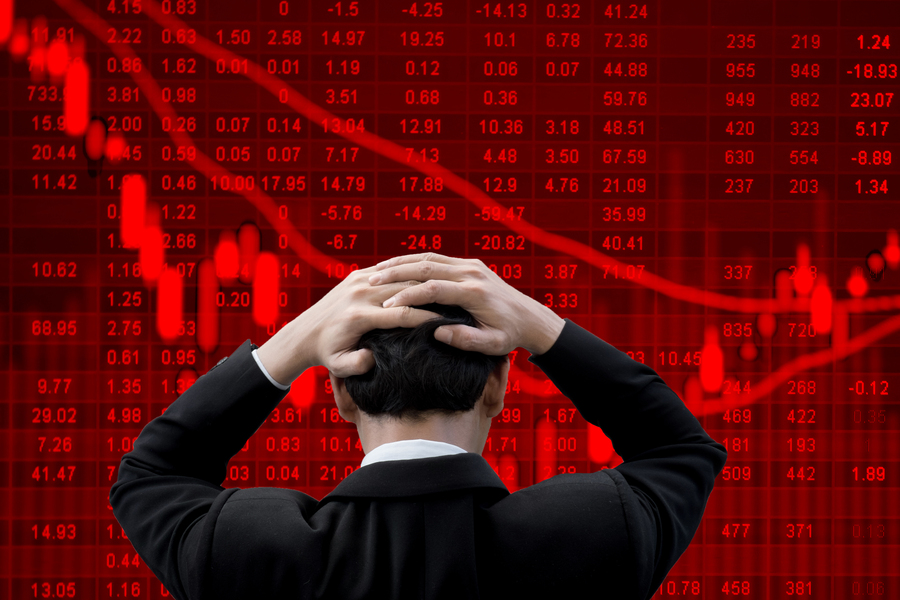I WANT
RELATED LINKS
I WANT
RELATED LINKS
RELATES LINKS
I WANT
RELATES LINKS
Services
Related Links
Use and Management of Cookies
We use cookies and other similar technologies on our website to enhance your browsing experience. For more information, please visit our Cookies Notice.
- Personal Banking
- Stories & Tips
- Grow Your Wealth
- Strategize your investment during the market crash
- Personal Banking
- ...
- Strategize your investment during the market crash
Strategize your investment during the market crash
28-09-2020
Bear Market Is a short definition That investors are well known when talking about the stock market in the downtrend. A popular definition of a stock market going bearish is if the stock market index dropped more than 20% from its 52-week (or 1-year) high and its volume fell. But what exactly is a bear market? And what are the symbols that remind investors that the stock market has entered a bear market.
What is the bear market?
A bear market is used to refer to when the stock market dropped 20% from its most recent high. It is also used to refer to a stock index or individual stock that has fallen 20% or more from its most recent peak.
Factors causing the bear market
The main factor is investor fear or indecision. Including other factors such as excessive speculation. Volatile oil prices or the latest COVID-19 virus outbreak. This resulted in a global bear market as investors move their funds into secure assets (like gold). There is also the possibility to encounter unemployment. Or economic downturn during the period of market decline as well

Investing in a bear market
As an investor, seeing his own investment portfolio during a bear market situation, the question arises: "What should I do?" "Should I sell my portfolio?" Before answering these questions, don't be quick to decide what to do. Investors should first understand the bear market strategy.
1. Most importantly, don't panic in a bear market
And understand that stock market declines are inevitable and bear markets are temporary. And will recover eventually, according to statistics, the stock market will drop 13% at some time of the year. And there will be a bear market every 6 years
2.Investors must know the level of risk they accept
Experimenting with simulated stock portfolios before making a real investment will help investors to know better themselves as investors who can accept the risks. And ready or not for real investment
3.In a bear market Investors should invest in a variety of assets to diversify their risks.
Besides investing in the stock market May consider investing in debt instruments Derivatives Or maybe invest in real estate
4.Investors should know how long it will take to invest
If you start investing in your 20s to 30s, you should make a long-term investment plan. Because it has a long time to invest, you can wait for the market to recover. For example, allocating money to invest in high-risk instruments, such as investing in stocks of 80 - 90%, where the selected stocks should be stocks with good fundamentals, have financial stability, have satisfactory dividends. And there is a chance to grow in the future. The other 10 - 20% should invest in debt and deposits.
On the other hand, if investing in the ages of 40 - 50 years near the retirement age Should be diversified into low-risk assets, for example, allocate about 70% of the funds to a safe place. Such as debt instruments and deposits the remaining approximately 30% is invested in long-term stocks. To increase savings and investments.

5. During the bear market Some investors immediately sell all their shares
Because of fear that the price will drop even more. And as the market returns, the stock prices go up and investors will buy in the hopes of making a profit. This contradicts what investors should do is "buy cheap, sell high" Because investors use emotions in making decisions and lack good planning Therefore mistakes and go against what should be done. If investors carefully consider and plan to invest in the long term. Will be able to cope in the market situation of falling and wait for the moment to make a profit at the right time.
6. Warren Buffett said, "The moment of market decline is the best time for investors to know what entrepreneurs have true potential
In a COVID-19 crisis, companies with poor performance will be severely affected. But companies with true quality performance go through times when the market is down. And that is the stock that investors must find and invest for profit.
7. Don't hesitate to invest because you think Not the lowest price yet.
Investors should focus on investing in the long term. And what should be considered during market downturns is to invest regularly and be disciplined. By investing on a regular basis (Dollar Cost Average: DCA) is a suitable choice. Although the gradual investment is not the best way (When looking at the return), but it is the best way to look at risk management. Even when the price of investment assets has dropped a lot if investing in DCA during this period will result in lower costs.
8. Be patient and learn at the same time.
In addition to not panicking in the bear market. Another feature that investors should have is patience and take the time to understand the bear market. To prevent mistakes from making mistakes during the tense market downturn.
When knowing the market and understanding the risks it faces Will be able to plan well and find opportunities to generate returns for sure.
